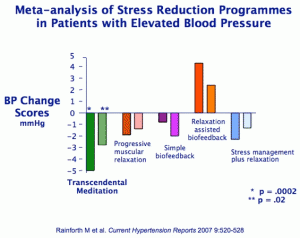 Transcendental Meditation may be considered in clinical practice to reduce blood pressure.
Transcendental Meditation may be considered in clinical practice to reduce blood pressure.
This is a conclusion of the American Heart Association, which recently published a fascinating scientific statement on alternative approaches to lowering blood pressure
The AHA points out that there is a “90% lifetime risk for developing hypertension among middle-aged adults with normal blood pressure,” and that a quarter of the world’s population suffers from this problem, which accounts for over 13% of all deaths.
Seven years ago the AHA made a scientific statement on diet-based help for high blood pressure. However, diets are hard to keep up. Drugs are not necessarily cost-effective or free of side-effects, and people and their health-care providers may wish to avoid them. Drug resistant hypertension is increasing.
So it is not surprising that interest is growing in other therapies for managing blood pressure.
According to the AHA, these alternatives are broadly classified into 3 categories:
- Behavioural therapies: including meditation techniques, yoga, biofeedback, and relaxation or stress-reduction programs;
- Noninvasive procedures or devices: including device-guided breathing modulation and acupuncture; and
- Exercise-based regimens: including aerobic, resistance, and isometric exercise methods.
The AHA statement, issued on 22 April this year, summarises the blood pressure–lowering effects of several of these approaches and grades recommendations for their implementation in clinical practice based on evidence from the published literature. It is no surprise that exercise carries the strongest weight — but the real breakthrough, to my way of thinking is in the formal recognition given to Transcendental Meditation, and the recommendation that it may be used in clinical practice to reduce blood pressure.
No other meditation technique was accorded this status.
This is how they put it:
“Among behavioural therapies, Transcendental Meditation (Class IIB, Level of Evidence B), other meditation techniques (Class III, Level of Evidence C), yoga (Class III, Level of Evidence C), other relaxation therapies (Class III, Level of Evidence B), and biofeedback approaches (Class IIB, Level of Evidence B) generally had modest, mixed, or no consistent evidence demonstrating their efficacy.
via http://hyper.ahajournals.org/content/61/6/1360.full
Notice that that the writers unfortunately and unwisely lump all behavioural therapies together, despite the fact they rated TM and biofeedback in a class of their own (Class IIB, Level of Evidence B).
The AHA goes on to write: “it is reasonable for all individuals with blood pressure levels >120/80 mm Hg to consider trials of alternative approaches as adjuvant methods to help lower blood pressure when clinically appropriate.”
Lets take a closer look at the TM findings.
The University of Alberta Evidence-Based Practice Center prepared the report. It was funded by the National Center for Complementary and Alternative Medicine and included, for hypertension, 5 trials of TM, and 2 additional meta-analyses evaluating the effects of TM on BP.
They concluded: “The overall evidence supports that TM modestly lowers BP. It is not certain whether it is truly superior to other meditation techniques in terms of BP lowering because there are few head-to-head studies. … Additional and higher-quality studies are required to provide conclusions on the BP-lowering efficacy of meditation forms other than TM.
“The writing group conferred to TM a Class IIB, Level of Evidence B recommendation in regard to BP-lowering efficacy.
“TM may be considered in clinical practice to lower BP.
“Because of many negative studies or mixed results and a paucity of available trials, all other meditation techniques (including MBSR) received a Class III, no benefit, Level of Evidence C recommendation Thus, other meditation techniques are not recommended in clinical practice to lower BP at this time.”
via http://hyper.ahajournals.org/content/61/6/1360.full
So there you have it. The evidence is right there in your face that Transcendental Meditation reduces blood pressure in those suffering from high blood pressure.
Not only that, but it is safe, without undesirable side-effects and confers many other benefits. So if you or your patient’s blood pressure is on the borderline of hypertension and you wish to avoid drugs, transcendental meditation should be on your list.
References:
1. Anderson JW, Liu C, Kryscio RJ. Blood pressure response to Transcendental Meditation: a meta-analysis. Am J Hypertens. 2008;21:310–316. Abstract
2. Rainforth MV, Schneider RH, Nidich SI, Gaylord-King C, Salerno JW, Anderson JW. Stress reduction programs in patients with elevated blood pressure: a systematic review and meta-analysis. Curr Hypertens Rep. 2007;9:520–528. Medline
3. Nidich SI, Rainforth MV, Haaga DA, Hagelin J, Salerno JW, Travis F, Tanner M, Gaylord-King C, Grosswald S, Schneider RH. A randomized controlled trial on effects of the Transcendental Meditation program on blood pressure, psychological distress, and coping in young adults. Am J Hypertens. 2009;22:1326–1331. Abstract
4. Schneider RH, Grim CE, Rainforth MV, Kotchen T, Nidich SI, Gaylord-King C, Salerno JW, Kotchen JM, Alexander CN. Stress reduction in the secondary prevention of cardiovascular disease: randomized, controlled trial of Transcendental Meditation and health education in blacks. Circ Cardiovasc Qual Outcomes. 2012;5:750–758. Abstract

